外资企业与中国就业【外文翻译】
- 格式:doc
- 大小:37.00 KB
- 文档页数:6
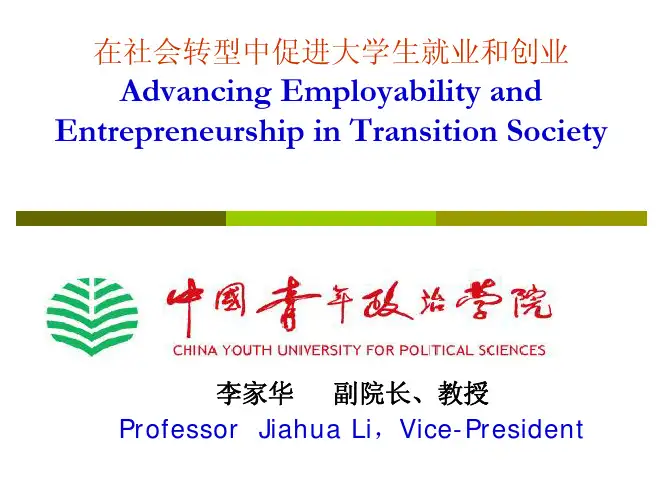
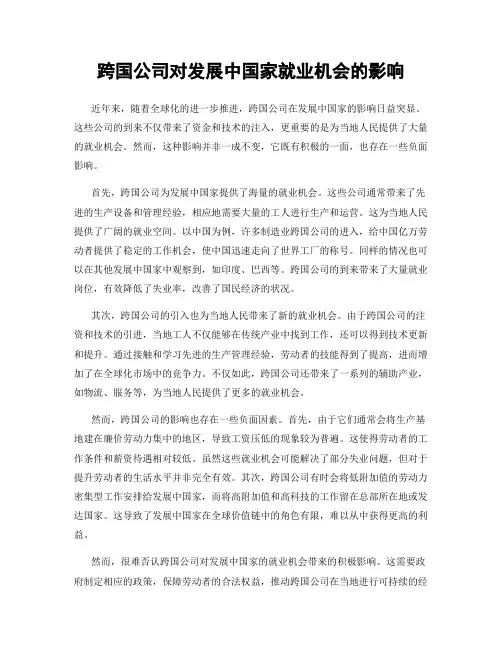
跨国公司对发展中国家就业机会的影响近年来,随着全球化的进一步推进,跨国公司在发展中国家的影响日益突显。
这些公司的到来不仅带来了资金和技术的注入,更重要的是为当地人民提供了大量的就业机会。
然而,这种影响并非一成不变,它既有积极的一面,也存在一些负面影响。
首先,跨国公司为发展中国家提供了海量的就业机会。
这些公司通常带来了先进的生产设备和管理经验,相应地需要大量的工人进行生产和运营。
这为当地人民提供了广阔的就业空间。
以中国为例,许多制造业跨国公司的进入,给中国亿万劳动者提供了稳定的工作机会,使中国迅速走向了世界工厂的称号。
同样的情况也可以在其他发展中国家中观察到,如印度、巴西等。
跨国公司的到来带来了大量就业岗位,有效降低了失业率,改善了国民经济的状况。
其次,跨国公司的引入也为当地人民带来了新的就业机会。
由于跨国公司的注资和技术的引进,当地工人不仅能够在传统产业中找到工作,还可以得到技术更新和提升。
通过接触和学习先进的生产管理经验,劳动者的技能得到了提高,进而增加了在全球化市场中的竞争力。
不仅如此,跨国公司还带来了一系列的辅助产业,如物流、服务等,为当地人民提供了更多的就业机会。
然而,跨国公司的影响也存在一些负面因素。
首先,由于它们通常会将生产基地建在廉价劳动力集中的地区,导致工资压低的现象较为普遍。
这使得劳动者的工作条件和薪资待遇相对较低。
虽然这些就业机会可能解决了部分失业问题,但对于提升劳动者的生活水平并非完全有效。
其次,跨国公司有时会将低附加值的劳动力密集型工作安排给发展中国家,而将高附加值和高科技的工作留在总部所在地或发达国家。
这导致了发展中国家在全球价值链中的角色有限,难以从中获得更高的利益。
然而,很难否认跨国公司对发展中国家的就业机会带来的积极影响。
这需要政府制定相应的政策,保障劳动者的合法权益,推动跨国公司在当地进行可持续的经营,促进技术和创新的转化,提高劳动者的技能水平和薪资待遇。
此外,跨国公司也应该履行社会责任,积极参与当地的公益事业,提高社会福利水平。
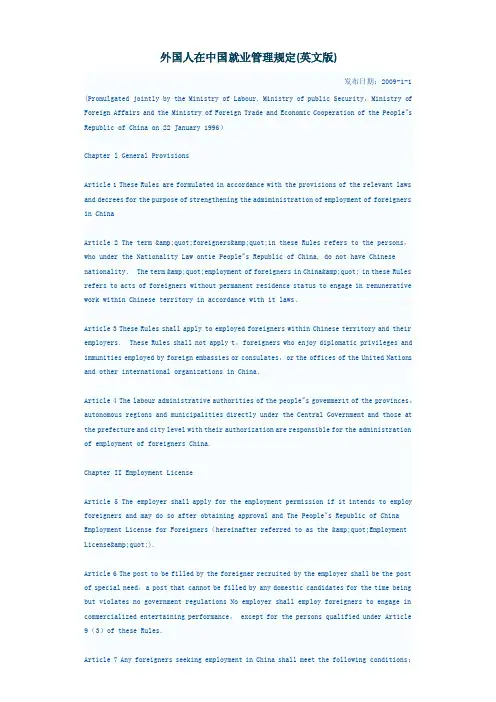
外国人在中国就业管理规定(英文版)发布日期:2009-1-1 (Promulgated jointly by the Ministry of Labour, Ministry of public Security,Ministry of Foreign Affairs and the Ministry of Foreign Trade and Economic Cooperation of the People"s Republic of China on 22 January 1996)Chapter l General ProvisionsArticle 1 These Rules are formulated in accordance with the provisions of the relevant laws and decrees for the purpose of strengthening the admiministration of employment of foreigners in ChinaArticle 2 The term "foreigners"in these Rules refers to the persons,who under the Nationality Law ont1e People"s Republic of China, do not have Chinese nationality. The term "employment of foreigners in China" in these Rules refers to acts of foreigners without permanent residence status to engage in remunerative work within Chinese territory in accordance with it laws.Article 3 These Rules shall apply to employed foreigners within Chinese territory and their employers. These Rules shall not apply t。
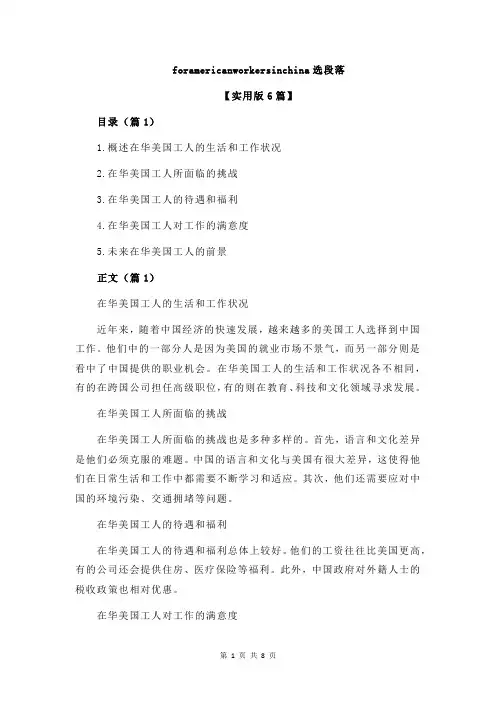
foramericanworkersinchina选段落【实用版6篇】目录(篇1)1.概述在华美国工人的生活和工作状况2.在华美国工人所面临的挑战3.在华美国工人的待遇和福利4.在华美国工人对工作的满意度5.未来在华美国工人的前景正文(篇1)在华美国工人的生活和工作状况近年来,随着中国经济的快速发展,越来越多的美国工人选择到中国工作。
他们中的一部分人是因为美国的就业市场不景气,而另一部分则是看中了中国提供的职业机会。
在华美国工人的生活和工作状况各不相同,有的在跨国公司担任高级职位,有的则在教育、科技和文化领域寻求发展。
在华美国工人所面临的挑战在华美国工人所面临的挑战也是多种多样的。
首先,语言和文化差异是他们必须克服的难题。
中国的语言和文化与美国有很大差异,这使得他们在日常生活和工作中都需要不断学习和适应。
其次,他们还需要应对中国的环境污染、交通拥堵等问题。
在华美国工人的待遇和福利在华美国工人的待遇和福利总体上较好。
他们的工资往往比美国更高,有的公司还会提供住房、医疗保险等福利。
此外,中国政府对外籍人士的税收政策也相对优惠。
在华美国工人对工作的满意度尽管在华美国工人面临着诸多挑战,但他们对工作的满意度总体上较高。
他们认为,中国的工作环境更加宽松,工作压力相对较小。
同时,中国的职业发展机会也更多。
未来在华美国工人的前景随着中国经济的持续发展和对外开放的深化,未来在华美国工人的前景看好。
他们将有更多的职业机会和更好的发展空间。
同时,随着中国政府对外籍人士的优惠政策不断完善,他们的生活和工作环境也将得到进一步改善。
总之,在华美国工人的生活和工作状况是复杂的,他们既面临着挑战,也拥有机会。
目录(篇2)1.引言:介绍《For American Workers in China》一书的背景和重要性2.作者及书籍简介:介绍作者 Leslie T.Chang 及其著作《For American Workers in China》3.主题:探讨美国工人阶级在中国的困境和挑战4.结论:总结全文,强调《For American Workers in China》一书对理解全球化下劳动关系的重要性正文(篇2)《For American Workers in China》是一本由 Leslie T.Chang 撰写的著作,该书通过揭示美国工人阶级在中国的困境和挑战,为我们理解全球化下的劳动关系提供了宝贵的视角。
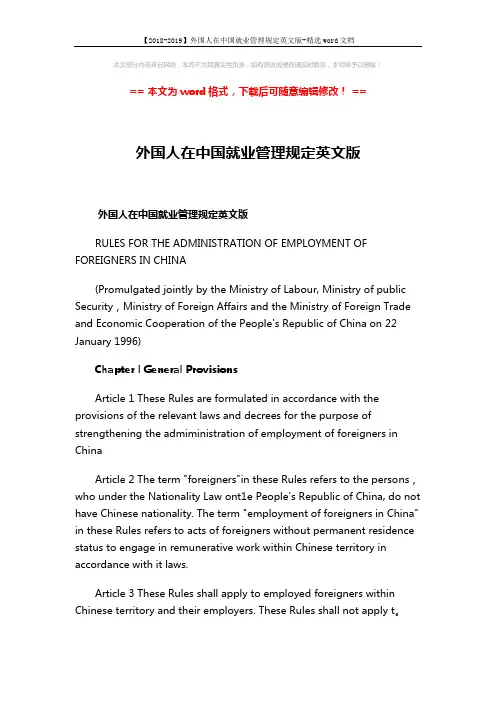
【2018-2019】外国人在中国就业管理规定英文版-精选word文档本文部分内容来自网络,本司不为其真实性负责,如有异议或侵权请及时联系,本司将予以删除!== 本文为word格式,下载后可随意编辑修改! ==外国人在中国就业管理规定英文版外国人在中国就业管理规定英文版RULES FOR THE ADMINISTRATION OF EMPLOYMENT OF FOREIGNERS IN CHINA(Promulgated jointly by the Ministry of Labour, Ministry of public Security,Ministry of Foreign Affairs and the Ministry of Foreign Trade and Economic Cooperation of the People's Republic of China on 22 January 1996)Chapter l General ProvisionsArticle 1 These Rules are formulated in accordance with the provisions of the relevant laws and decrees for the purpose of strengthening the admiministration of employment of foreigners in ChinaArticle 2 The term "foreigners"in these Rules refers to the persons,who under the Nationality Law ont1e People's Republic of China, do not have Chinese nationality. The term "employment of foreigners in China" in these Rules refers to acts of foreigners without permanent residence status to engage in remunerative work within Chinese territory in accordance with it laws.Article 3 These Rules shall apply to employed foreigners within Chinese territory and their employers. These Rules shall not apply t。
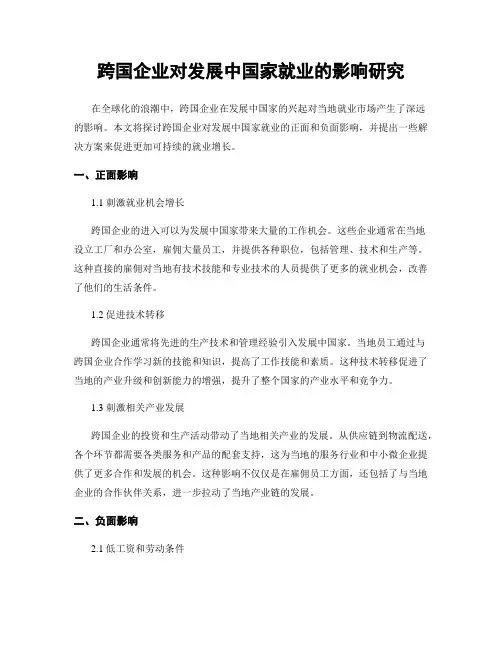
跨国企业对发展中国家就业的影响研究在全球化的浪潮中,跨国企业在发展中国家的兴起对当地就业市场产生了深远的影响。
本文将探讨跨国企业对发展中国家就业的正面和负面影响,并提出一些解决方案来促进更加可持续的就业增长。
一、正面影响1.1 刺激就业机会增长跨国企业的进入可以为发展中国家带来大量的工作机会。
这些企业通常在当地设立工厂和办公室,雇佣大量员工,并提供各种职位,包括管理、技术和生产等。
这种直接的雇佣对当地有技术技能和专业技术的人员提供了更多的就业机会,改善了他们的生活条件。
1.2 促进技术转移跨国企业通常将先进的生产技术和管理经验引入发展中国家。
当地员工通过与跨国企业合作学习新的技能和知识,提高了工作技能和素质。
这种技术转移促进了当地的产业升级和创新能力的增强,提升了整个国家的产业水平和竞争力。
1.3 刺激相关产业发展跨国企业的投资和生产活动带动了当地相关产业的发展。
从供应链到物流配送,各个环节都需要各类服务和产品的配套支持,这为当地的服务行业和中小微企业提供了更多合作和发展的机会。
这种影响不仅仅是在雇佣员工方面,还包括了与当地企业的合作伙伴关系,进一步拉动了当地产业链的发展。
二、负面影响2.1 低工资和劳动条件跨国企业往往在发展中国家设立工厂,吸引就业的同时,也会降低当地的工资水平。
他们通常采用廉价劳动力来降低生产成本,这导致了当地工人收入低和工作条件差。
长期以来,这一现象一直存在,阻碍了当地劳动者的工资增长和职业发展。
2.2 不稳定的就业跨国企业在一些发展中国家的投资往往没有较长的稳定性。
他们的投资决策可能受到政治、经济和商业环境的影响,进而影响到当地就业的稳定性。
一旦企业遇到困难或者在其他地区找到更具竞争力的商业环境,他们可能会迅速撤离或削减当地的员工规模,从而造成原本繁荣的就业市场迅速衰退。
2.3 跨国企业的垄断地位一些跨国企业在发展中国家取得了市场的垄断地位。
他们由于规模和资源的优势,可以通过低价和强大的竞争力排挤本土企业,从而削弱当地的竞争力和创新能力。
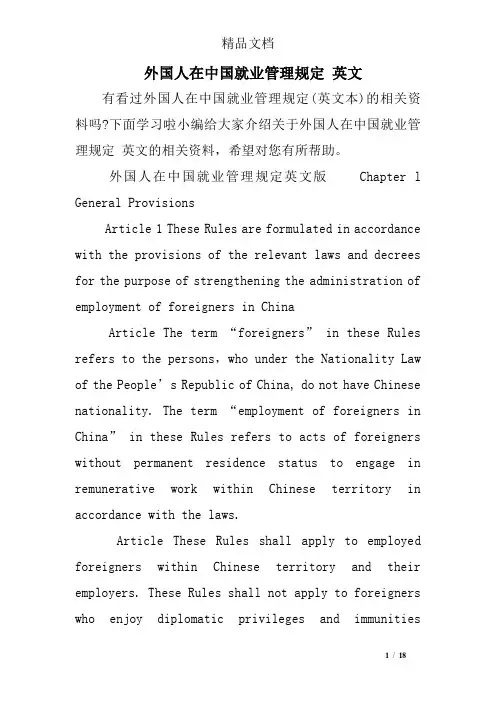
外国人在中国就业管理规定英文有看过外国人在中国就业管理规定(英文本)的相关资料吗?下面学习啦小编给大家介绍关于外国人在中国就业管理规定英文的相关资料,希望对您有所帮助。
外国人在中国就业管理规定英文版 Chapter l General ProvisionsArticle 1 These Rules are formulated in accordance with the provisions of the relevant laws and decrees for the purpose of strengthening the administration of employment of foreigners in ChinaArticle The term “foreigners” in these Rules refers to the persons,who under the Nationality Law of the People’s Republic of China, do not have Chinese nationality. The term “employment of foreigners in China” in these Rules refers to acts of foreigners without permanent residence status to engage in remunerative work within Chinese territory in accordance with the laws.Article These Rules shall apply to employed foreigners within Chinese territory and their employers. These Rules shall not apply to foreigners who enjoy diplomatic privileges and immunitiesemployed by foreign embassies or consulates,or the offices of the United Nations and other international organizations in China.Article The labour administrative authorities of the people’s government of the provinces,autonomous regions and municipalities directly under the Central Government and those at the prefecture and city level with their authorization are responsible for the administration of employment of foreigners in China. Chapter II Employment LicenseArticle The employer shall apply for the employment permission if it intends to employ foreigners and may do so after obtaining approval and The People’s Republic of China Employment License for Foreigners(hereinafter referred to as the “Employment License”).Article The post to be filled by the foreigner recruited by the employer shall be the post of special need,a post that cannot be filled by any domestic candidates for the time being but violates no government regulations. No employer shall employ foreigners to engage in commercialized entertainingperformance, except for the persons qualified under Article(3)of these Rules.Article Any foreigners seeking employment in China shall meet the following conditions:(1)1years of age or older and in good health(2)with professional skills and job experience required for the work of intended employment;(3)with no criminal record;(4)a clearly-defined employer;(5)with valid passport or other international travel document in lieu of the passport(hereinafter referred to as the “Travel Document”).Article Foreigners seeking employment in China shall hold the Employment Visas for their entry(In case of agreement for mutual exemption of visas,the agreement shall prevail.), and may wok within Chinese territory only after they obtain the Employment Permit for Foreigner(hereinafter referred to as the “Employment Permit”)and the foreigner residence certificate.Foreigners who have not been issued residence certificate (i.e. holders of F,L,C or G-types visas),and those who are under study or interim programs in China and the families of holders of Employment Visas shall not work in China.In special cases,employment may be allowed when the foreigner changes his status at the public security organs with the Employment License secured by his employer in accordance with the clearance procedures under these Rules. Foreigners changes his status at the public security organs with the Employment License and receives his Employment Permit and residence certificate.The employment in China of the spouses of the Personnel of foreign embassies, consulates,representative offices of the United Nations System and other international organizations in China shall follow the Provisions of Ministry of Foreign Affairs of the People’s Republic of China Concerning the Employment of the Spouses of the Personnel of Foreign Embassies,Consulates and the Representative Offices of the United Nations System in China and be handled in accordance with the clearance procedures provided for in the second paragraph of this article.The Employment License and the Employment Permitshall be designed and prepared exclusively by the Ministry of Labour.Article Foreigners may be exempted from the Employment License and Employment Permit when they meet any of the following conditions:(1)foreign professional technical and managerial personnel employed directly by the Chinese government or those with senior technical titles or credentials of special skills recognized by their home or international technical authorities or professional associations to be employed by Chinese government organs and institutions and foreigners holding Foreign Expert Certificate issued by China’s Bureau of Foreign Expert Affairs;(2)foreign workers with special skills who wok in offshore petroleum operations without the need to go ashore for employment and hold “Work Permit for Foreign Personnel Engaged in the Offshore petroleum Operations in the People’s Republic of China”;(3)foreigners who conduct commercialized entertaining performance with the approval of the Ministry of Culture and hold “Permit for TemporaryCommercialized Performance”.Article 10 Foreigners may be exempted from the Employment License and may apply directly for the Employment Permit by presenting their Employment Visas and relevant papers after their entry when they meet any of the following conditions:(1)foreigners employed in China under agreements or accords entered into by the Chinese government with foreign governments or international organizations for the implementation of Sino-foreign projects of cooperation and exchange;(2)chief representatives and representatives of the permanent offices of foreign enterprises in China. Chapter III Application and ApprovalArticle 11 The employer when intending to employ a foreigner,shall fill out the Application Form for the Employment of Foreigners(hereinafter referred to as the”Application Form”)and submit it to its competent trade authorities at the same level as the labour administrative authorities together with the following documentations:(1)the curriculum vitae of the foreigner to beemployed;(2)the letter of intention for employment;(3)the report of reasons for employment;(4)the credentials of the foreigner required for the performance of the job;(5)the health certificate of the foreigner to be employed;(6)other documents required by regulations. The competent trade authorities shall examine and approve the application in accordance with Articles and of these Rules and relevant laws and decrees.Article 1After the approval by the competent trade authorities,the employer shall take the Application Form to the labour administrative authorities of the province,autonomous region or municipality directly under the Central Government or the labour administrative authorities at the prefecture and city level where the said employer is located for examination and clearance.The labour administrative authorities described above shall designate a special body(hereinafter referred to as the”Certificate Office”) to take upthe responsibility of issuing the Employment License.The Certificate Office should take into consideration of the opinions of the competent trade authorities and the demand and supply of labour market,and issue the Employment License to the employer after examination and clearance.Article 1Employers at the Central level or those without the competent trade authorities may submit their application directly to the Certificate Office of the labour administrative authorities for the Employment License.The examination and approval by the competent trade authorities is not required for foreign-funded enterprises to employ foreigners,and such enterprises may submit their applications directly to the Certificate Office of the labour administrative authorities for the Employment License,bringing with them the contract, articles of association, certificate of approval, business license and the documents referred to in Article 11of these Rules.Article 1Employers with permission to employ foreigners shall not send the Employment License northe letter of visa notification directly to the foreigners to be employed and they must be sent by the authorized unit.Article 1Foreigners with permission to work in China should apply for Employment Visas at the Chinese embassies,consulates and visa offices, bringing with them the Employment License issued by the Ministry of Labour,the letter or telex of visa notification sent by the authorized unit and the valid passport or Travel Document.Personnel referred to in Article(1)of these Rules should apply for the Employment Visas by presenting their letter or telex of visa notification by authorized unit;personnel referred to in Article(2) should apply for the Employment Visas by presenting their letter or telex of visa notification issued by the China National Offshore Oil Corporation;personnel referred to in Article9(3)should apply for the Employment Visas by presenting their letter or telex of visa notification issued by the foreign affairs, office under the people’s gov ernment of provinces, autonomous regions or municipalitiesdirectly under the Central Government and the relevant documents of approval of the Ministry of Culture (addressed to the Chinese embassies,consulates or visa offices).Personnel referred to in Article 10(1)of these Rules should apply for the Employment Visas by presenting their letter or telex of visa notification by authorized unit and the documentation on projects of cooperation and exchange;personnel referred to in Article 10(2)should apply for the Employment Visas by presenting their letter or telex of visa notification by the authorized unit and the registration certification issued by the administrative authorities of industry and commerceArticle 1The employer should,within fifteen days after the entry of the employed foreigner, take to the original Certificate Office the Employment License, the labour contract with the said foreigner and his passport or Travel Document to receive his Employment Permit while filling out the Foreigner Employment Registration Form. The Employment Permit shall be effective only within the area specified by theCertificate Office.Article 1Foreigners who received their Employment Permit should,within thirty days after their entry,apply for the residence certificate with the public security organs bringing with them their Employment Permit. The term of validity of the residence certificate may be determined in accordance with the term of validity of the Employment Permit.Chapter IV Labour AdministrationArticle 1The employer and its foreign employee should,in accordance with law,conclude a labour contract,the term of which shall not exceed five years. Such contract may be renewed upon expiration after the completion of clearance process in accordance with Article 1of these Rules.Article 1The Employment Permit of the employed foreigner shall cease to be effective upon the expiration of the term of the labour contract between the foreigner and his employer.If renewal is required,the employer should,within thirty days prior to the expiration of the contract,submit an application to the labour administrative authorities for theextension of term of employment,and after approval is obtained,proceed to go through formalities for the extension of the Employment Permit.Article0 The foreign employee should,within ten days after obtaining the approval for extension of his term of employment in China or the change of his employment location or his employer, go through formalities for the extension or change of his residence certificate at the local public security organs.Article1 After the termination of the labour contract between the foreign employee and his employer,the employer should promptly report it to the labour and public security authorities,return the Employment Permit and the residence certificate of the said foreigner,and go through formalities for his exit from ChinaArticleThe wage paid to the foreign employee by the employer shall not be lower than the minimum wage in the locality.ArticleThe working hours,rest and vacation,work safety and hygiene as well as the social security ofthe foreign employees in China shall follow the relevant provisions of the state.ArticleThe employer of the foreign employee in China shall be the same as specified in his Employment License. When the foreigner switches employers within the area designated by the Certificate Office but stays in a job of the same nature,the change must be approved by the original Certificate Office and recorded in his Employment Permit. If the foreigner is to be employed outside the area designated by the Certificate Office or switch employer within original designated area while taking up jobs of a different nature,he must go through formalities for a new Employment License.ArticleFor foreigner whose res1dence status is revoked by public security organs due to his violation of Chinese law, his Labour Contract should be terminated by his employer and his Employment Permit be withdrawn by the labour administrative authorities. ArticleShould labour disputes arise between the employer and its foreign employee, they should be handled in accordance with the Labour Law of the People’s Republic of China and the Regulations of thePeople’s Republic of China on Settlement of Labour Disputes in Enterprises.ArticleThe labour administrative authorities shall conduct an annual inspection of the Employment Pemit within thirty days prior to the end of every year of employment of the foreigner.the employer should go through formalities of the annual inspection at the Certificate Office of the labour administrative authorities. The Employment Permit shall automatically cease to be effective when the deadline is passed. In case of loss or damage of the Emp1oyment Permit during the term of his employment in China the foreigner should promptly report it to the original Certificate Office and go through formalities for the issuance of the Employment Permit.Chapter V Penalty ProvisionsArticleViolatlon of these Rules,i.e. Foreigners who work without the Employment Permit or employers which hire foreigners without the Employment License, shall be handled by the public security organs in accordance with Articleof the Rules Governing the implementation of the Law of the People’s Republic ofChina on the Entry and Exit of Aliens.ArticleFor foreigners who refuse to have their Employment Permit inspected by the labour administrative authorities,change their employers and professions at will or extend their term of employment without permission, the labour administrative authorities shall withdraw their Employment Permit and recommend that their residence status be canceled by the public security organs. In case of deportation, the costs and expenses shall be borne by the said foreigner or their employers.Article0 For foreigners and employers who forge, alter, falsely use, transfer, buy and sell the Employment Permit and the Employment License, the labour administrative authorities shall take over the Employment Permit and the Employment License in question, confiscate the illegal proceeds and impose a fine between ten thousand and one hundred thousand RMB Yuan. In serious cases which constitute a crime, their criminal responsibility of the perpetrators shall be looked into by the judicial authorities.Article1 In case of abuse of power, illegalcollection of fees, and fraudulent practices on the part of official personnel of the Certificate Office or other department, they shall be investigated in accordance with the law for their criminal responsibility if crimes are committed, or they shall be subject to administrative disciplinary measures if the cases do not constitute a crime.Chapter VI Supplementary ProvisionsArticleThe employment in the mainland of the residents of Tai Wan, Hong Kong and Macao regions of China shall follow the Rules for the Administration of the Employment in the Mainland of Residents of Tai Wan, Hong Kong and Macao.ArticleThese Rules do not apply to the employment of foreigners in China’s Taiwan, Hong Kong and Macao regions.ArticleIndividual economic organizations and private citizens are prohibited from employing foreigners.ArticleThe labour administrative authorities of the provinces,autonomous regions and municipalities directly under the Central Government may formulatetheir own rules for implementation of these Rules in conjunction with the public security and relevant authorities in the locality,and report it to the Ministry of Labour,Ministry of Public Security,Ministry of Foreign Affairs and the Ministry of Foreign Trade and Economic Cooperation for putting on record. ArticleThe Ministry of Labour shall be responsible for the interpretation of these Rules.Article3These Rules shall enter into force as of 1 May 1996.The Provisions Concerning the Employment in China of the Foreigners Who Have Not Yet Obtained Residence Certificate and Foreigners Who Study in China jointly promulgated by the former Ministry of Labour and Personnel and the Ministry of Public Security on October 198shall be annulled simultaneously.外国人在中国就业管理规定英文相关文章:1.公司管理规定英文版2.外国人出入境管理规定3.企业名称登记管理规定英文4.外国人来不及申请中国签证怎么解决5.事业单位网上名称管理规定6.一款国外很流行的英文简历模板。
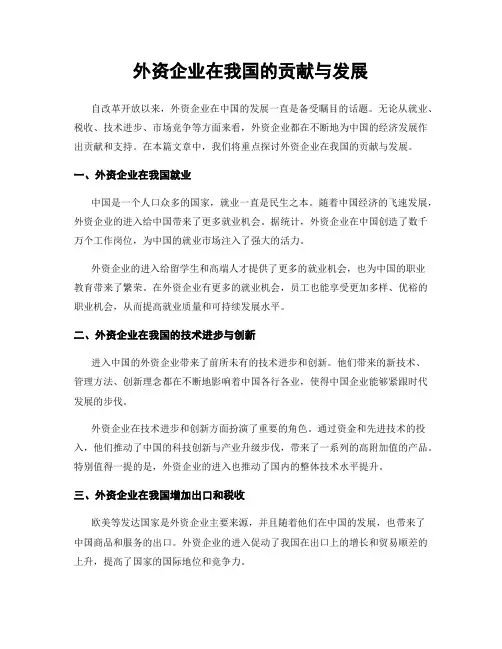
外资企业在我国的贡献与发展自改革开放以来,外资企业在中国的发展一直是备受瞩目的话题。
无论从就业、税收、技术进步、市场竞争等方面来看,外资企业都在不断地为中国的经济发展作出贡献和支持。
在本篇文章中,我们将重点探讨外资企业在我国的贡献与发展。
一、外资企业在我国就业中国是一个人口众多的国家,就业一直是民生之本。
随着中国经济的飞速发展,外资企业的进入给中国带来了更多就业机会。
据统计,外资企业在中国创造了数千万个工作岗位,为中国的就业市场注入了强大的活力。
外资企业的进入给留学生和高端人才提供了更多的就业机会,也为中国的职业教育带来了繁荣。
在外资企业有更多的就业机会,员工也能享受更加多样、优裕的职业机会,从而提高就业质量和可持续发展水平。
二、外资企业在我国的技术进步与创新进入中国的外资企业带来了前所未有的技术进步和创新。
他们带来的新技术、管理方法、创新理念都在不断地影响着中国各行各业,使得中国企业能够紧跟时代发展的步伐。
外资企业在技术进步和创新方面扮演了重要的角色。
通过资金和先进技术的投入,他们推动了中国的科技创新与产业升级步伐,带来了一系列的高附加值的产品。
特别值得一提的是,外资企业的进入也推动了国内的整体技术水平提升。
三、外资企业在我国增加出口和税收欧美等发达国家是外资企业主要来源,并且随着他们在中国的发展,也带来了中国商品和服务的出口。
外资企业的进入促动了我国在出口上的增长和贸易顺差的上升,提高了国家的国际地位和竞争力。
当然,外资企业也需要缴纳中国的所得税和其他税收,为中国的税收收入注入了相当数量的进项。
这些资金资助了中国的政府部门、职业教育、社会福利等很多领域,从而使得人民的生活变得更美好。
四、外资企业在我国的企业培养和市场竞争经过多年的发展,外资企业基本适应和融入了中国的市场环境。
完全是在竞争中成长的他们,拥有统筹协调的全方位优势、高效的管理体系、高质量的生产技术、先进思维方法和营销经验。
进入中国后,外资企业不断地与本土企业进行合作,学习和借鉴本土的特色。
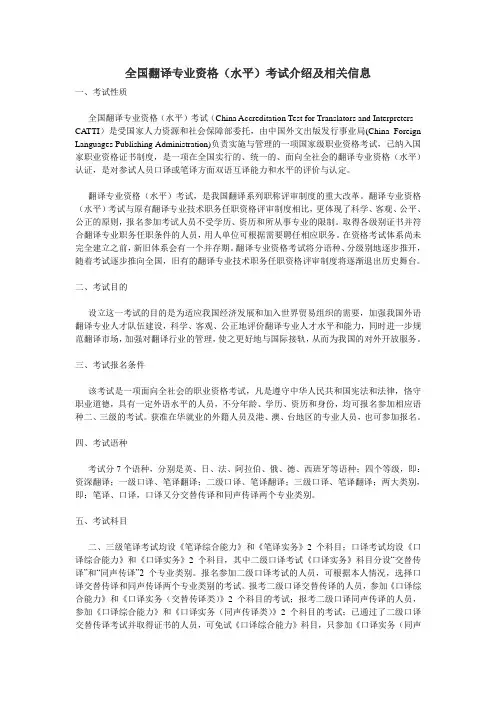
全国翻译专业资格(水平)考试介绍及相关信息一、考试性质全国翻译专业资格(水平)考试(China Accreditation Test for Translators and Interpreters -- CA TTI)是受国家人力资源和社会保障部委托,由中国外文出版发行事业局(China Foreign Languages Publishing Administration)负责实施与管理的一项国家级职业资格考试,已纳入国家职业资格证书制度,是一项在全国实行的、统一的、面向全社会的翻译专业资格(水平)认证,是对参试人员口译或笔译方面双语互译能力和水平的评价与认定。
翻译专业资格(水平)考试,是我国翻译系列职称评审制度的重大改革。
翻译专业资格(水平)考试与原有翻译专业技术职务任职资格评审制度相比,更体现了科学、客观、公平、公正的原则,报名参加考试人员不受学历、资历和所从事专业的限制。
取得各级别证书并符合翻译专业职务任职条件的人员,用人单位可根据需要聘任相应职务。
在资格考试体系尚未完全建立之前,新旧体系会有一个并存期。
翻译专业资格考试将分语种、分级别地逐步推开,随着考试逐步推向全国,旧有的翻译专业技术职务任职资格评审制度将逐渐退出历史舞台。
二、考试目的设立这一考试的目的是为适应我国经济发展和加入世界贸易组织的需要,加强我国外语翻译专业人才队伍建设,科学、客观、公正地评价翻译专业人才水平和能力,同时进一步规范翻译市场,加强对翻译行业的管理,使之更好地与国际接轨,从而为我国的对外开放服务。
三、考试报名条件该考试是一项面向全社会的职业资格考试,凡是遵守中华人民共和国宪法和法律,恪守职业道德,具有一定外语水平的人员,不分年龄、学历、资历和身份,均可报名参加相应语种二、三级的考试。
获准在华就业的外籍人员及港、澳、台地区的专业人员,也可参加报名。
四、考试语种考试分7个语种,分别是英、日、法、阿拉伯、俄、德、西班牙等语种;四个等级,即:资深翻译;一级口译、笔译翻译;二级口译、笔译翻译;三级口译、笔译翻译;两大类别,即:笔译、口译,口译又分交替传译和同声传译两个专业类别。
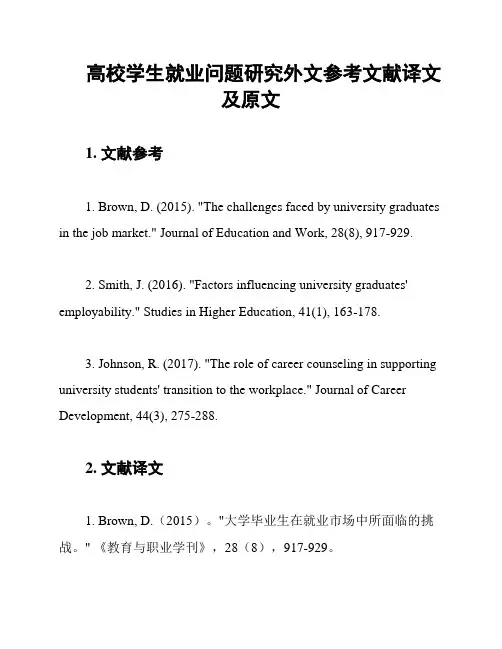
高校学生就业问题研究外文参考文献译文及原文1. 文献参考1. Brown, D. (2015). "The challenges faced by university graduates in the job market." Journal of Education and Work, 28(8), 917-929.2. Smith, J. (2016). "Factors influencing university graduates' employability." Studies in Higher Education, 41(1), 163-178.3. Johnson, R. (2017). "The role of career counseling in supporting university students' transition to the workplace." Journal of Career Development, 44(3), 275-288.2. 文献译文1. Brown, D.(2015)。
"大学毕业生在就业市场中所面临的挑战。
" 《教育与职业学刊》,28(8),917-929。
2. Smith, J.(2016)。
"影响大学毕业生就业能力的因素。
" 《高等教育研究》,41(1),163-178。
3. Johnson, R.(2017)。
"职业咨询在支持大学生进入职场的角色。
" 《职业发展学刊》,44(3),275-288。
3. 原文1. Brown, D. (2015). "The challenges faced by university graduates in the job market." Journal of Education and Work, 28(8), 917-929.2. Smith, J. (2016). "Factors influencing university graduates' employability." Studies in Higher Education, 41(1), 163-178.3. Johnson, R. (2017). "The role of career counseling in supporting university students' transition to the workplace." Journal of Career Development, 44(3), 275-288.。
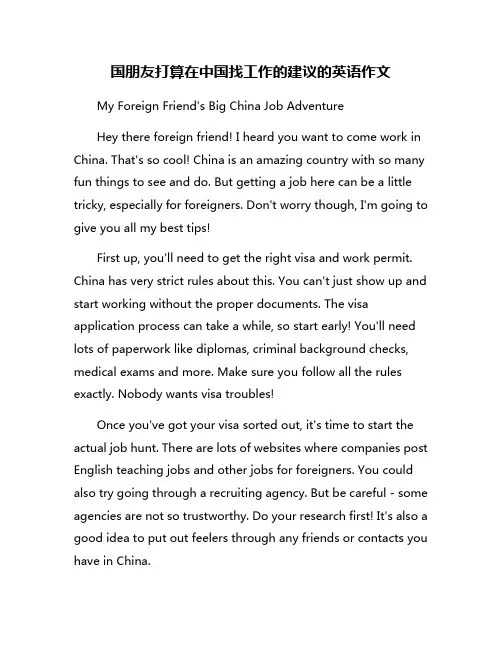
国朋友打算在中国找工作的建议的英语作文My Foreign Friend's Big China Job AdventureHey there foreign friend! I heard you want to come work in China. That's so cool! China is an amazing country with so many fun things to see and do. But getting a job here can be a little tricky, especially for foreigners. Don't worry though, I'm going to give you all my best tips!First up, you'll need to get the right visa and work permit. China has very strict rules about this. You can't just show up and start working without the proper documents. The visa application process can take a while, so start early! You'll need lots of paperwork like diplomas, criminal background checks, medical exams and more. Make sure you follow all the rules exactly. Nobody wants visa troubles!Once you've got your visa sorted out, it's time to start the actual job hunt. There are lots of websites where companies post English teaching jobs and other jobs for foreigners. You could also try going through a recruiting agency. But be careful - some agencies are not so trustworthy. Do your research first! It's also a good idea to put out feelers through any friends or contacts you have in China.When you get called for interviews, make sure you dress nicely and have copies of your certifications and other important documents. Chinese companies often value things like education credentials and experience more than in some other countries. If you don't have a lot of experience yet, talk about your passion for learning the language and culture! Enthusiasm counts for a lot.Assuming all goes well and you land an awesome job, get ready for a bit of a culture shock when you start working in China! The work culture here is often quite different from the West. For example, things tend to be more hierarchical. You'll be expected to show a lot of deference to bosses and senior colleagues. Work-life balance may also be different, with longer hours and less vacation time. And offices are usually pretty open plan without as much privacy.But there are great things about Chinese work culture too! Companies often feel like one big family, with cool group activities and bonding events. Stuff like company trips, fancy corporate dinners, and singing competitions. The social side of work is super important. Your Chinese coworkers will likely want to become close friends as well as colleagues.Another big difference is the style of communication. Chinese culture values subtlety, humility and saving face. People often speak in quite an indirect way, especially when giving feedback or saying no. Things get lost in translation all the time between Chinese and Western styles! My advice is to be very patient, observe carefully, and don't take things too literally.Oh, and be prepared for some good old-fashioned office quirks too! For example, some folks consider it bad luck to say the word "four" because it sounds like the word for death. Wild stuff, right? There are tons of little superstitions and customs like this. It's all part of the cultural adventure.Now let's talk about actually doing your job once you're hired. The number one thing is to have a positive, can-do attitude and be a respectful team player. In China, individual achievements often get less attention than group harmony and effort. Don't be a selfish lone wolf! Pitch in where needed, stay humble, and be flexible. Things often change at the last minute, so you've got to just roll with it.If your coworkers invite you out for team meals or activities, definitely go! Bonding and socializing are crucial parts of office life. Plus it's a chance to practice your Mandarin and learn about Chinese culture. Speaking of which - even if your Mandarin isn'tgreat yet, use whatever you've got and keep studying hard. Making the effort is very appreciated.One last tip about the work itself: check your assumptions at the door! You'll probably need to adapt teaching or working styles from back home. Maybe use more rote memorization techniques. Or get comfortable with students shouting out answers in unison. Just dive in and do things the Chinese way. You're here to learn as much as to teach!I know it seems like a lot to take in. But don't get discouraged, foreign friend! Working in China is an incredible experience that will help you grow so much. You'll make amazing memories and probably a few epic cultural faux pas too (don't worry, we all do it!). Soon enough you'll be slurping noodles with your officemates and feeling right at home.Just take it one day at a time. Study that Mandarin. Soak up all the sights, smells and chaos of daily life. Make Chinese friends who can guide you. Keep an open mind and a sense of humor. And most of all, have an amazing adventure!China is such an amazing place with the nicest people (once you get past the language barrier!). I just know you're going to love working here. Ganbatte for your big Chinese job quest! Letme know if you need any other tips from this elementary scholar. Zàijiàn!。
外资企业中方员工外语能力提升策略研究引言随着全球化进程的加速,越来越多的外资企业纷纷进入中国市场。
这些外资企业为了在中国的营销和业务拓展中取得成功,非常重视中方员工的外语能力。
在许多外资企业中,中方员工需要具备良好的外语沟通能力,才能更好地与国际团队合作和应对跨文化的挑战。
因此,本文将探讨外资企业中方员工外语能力提升的策略,并为外资企业提供有价值的建议。
1. 外资企业中方员工外语能力现状分析在外资企业中,中方员工的外语能力水平参差不齐。
一些员工具备了流利的外语交流能力,而另一些员工的外语能力相对较弱。
这种差异在很大程度上影响了企业的整体表现和竞争力。
因此,了解员工外语能力的现状,对于制定有效的提升策略至关重要。
1.1 外语能力水平的评估评估中方员工的外语能力水平可以通过多种方式实现。
有些外资企业会在招聘过程中进行面试和外语测试,以确保新员工具备所需的外语能力。
此外,一些企业还会定期进行内部评估,了解员工在外语交流方面的进展。
这些评估的结果可以帮助企业更好地了解员工的外语能力以及存在的问题。
1.2 外语能力差距的挑战外语能力差距给外资企业带来了许多挑战。
首先,无法有效沟通会导致信息传递不畅、工作延误等问题。
其次,员工缺乏外语能力可能无法胜任需要与外国同事或客户合作的岗位,这会限制企业的国际化发展。
因此,外资企业需要寻找提升员工外语能力的策略,以缩小外语能力差距。
2. 提升外语能力的策略探讨提升外语能力需要全方位的策略和支持。
以下是一些具体的提升策略,可供外资企业参考和应用。
2.1 外语培训与教育外资企业可以通过组织外语培训与教育来提升员工的外语能力。
这可以包括组织内部培训课程、资助员工参加外部培训项目,或与外语培训机构合作。
培训内容应针对不同员工的外语能力水平进行分类,包括听、说、读、写等方面的训练。
2.2 跨文化交流与合作提升外语能力不仅仅是提升语言技能,还需加强跨文化交流与合作的培养。
外资企业可以通过组织跨文化培训、安排国际交流项目等方式,帮助员工更好地理解不同文化背景下的沟通方式和合作方式。
外国友人来中国工作给建议语文作文Dear Sky,As your friend, I am quite delighted to hear that you intend to find a job in China and today, I am writing to make several suggestions.First, it is advisable for you to seek a job in Beijing, the capital city of China, which is characterized by the abundant employment opportunities. In addition, compared with others, you, as a native English speaker, have more advantages in teaching English and you have been working as a part-time teacher during the past years. Thus, I suggest that you try to apply for a teaching position in training organizations.I deem that your excellent teaching will bring Chinese students great efficiency, arouse their passion for English learning and help them speak English fluently.Yours sincerely,Li Ming【汉语译文】亲爱的思凯:作为您的朋友,我很高兴听说您打算来中国找工作。
今天,我写信提点建议。
首先,你应该来北京找工作,北京是中国的首都,其突出特征就是就业机会很多。
外资企业进入中国市场的影响分析近几十年来,随着中国经济的快速发展,越来越多的外资企业涌入中国市场,给中国经济带来了深远的影响。
本文将从经济、技术创新、产业升级等多个角度对外资企业进入中国市场的影响进行分析。
第一部分:贸易与经济影响外资企业的进入为中国带来了大量的外贸贡献,增加了出口和进口的规模。
中国成为世界最大的制造业和出口大国,外资企业在其中发挥着重要的作用。
外资企业的进出口贸易和国内的产业链相互融合,带动了中国的经济发展。
与此同时,外资企业在中国市场投资,为中国带来了大量的外汇和就业机会,提高了中国的就业率和居民收入水平。
第二部分:技术创新与产业升级外资企业在进入中国市场的同时,将先进的技术、管理经验和营销理念引入中国,对中国的技术创新和产业升级起到了积极的推动作用。
外资企业对中国的产业结构进行了重塑,推动了中国经济从传统的劳动密集型向技术密集型、知识密集型的升级转型。
外资企业带来的技术和管理经验的传播,激发了中国本土企业的创新力和竞争力,推动了中国整体经济水平的提升。
第三部分:市场竞争与特定行业发展外资企业进入中国市场的竞争对中国本土企业提出了更高的要求,激发了中国企业的竞争意识和创新能力。
中国市场的开放为外资企业提供了更广阔的发展空间,促进了行业的竞争与发展。
然而,也有些特定行业面临来自外资企业的竞争压力,一些本土企业难以与外资企业在品牌、技术等方面直接竞争,需要加强自身的技术创新和品牌建设。
第四部分:国际经验与管理方法引入外资企业通常具有先进的管理理念和管理方法,进入中国市场后会将这些经验带入中国,并借鉴中国的市场环境进行调整和优化。
这样的经验和管理方法的引入对中国企业提升管理水平、完善公司治理结构具有积极的引导作用。
同时,中国本土员工也可以通过与外资企业的合作与交流,学习到先进的管理技能和国际化的思维方式。
第五部分:合作与合资企业的发展随着外资企业进入中国市场的不断增多,合作与合资企业的发展越发重要。
ABSTRACT:Small and medium sized enterprises (SMEs) are playing an increasingly important role in the Chinese socialist market economy.摘要:中小型规模企业(中小企业)正发挥着越来越重要的作用,在中国社会主义市场经济。
Despite their importance to the Chinese economy, little is known about Chinese SMEs activities in internationalization markets.尽管它对于中国经济十分重要的,但中国中小企业在国际化市场活动却很少被知道。
Why and how do they internationalize? Do they behave in similar ways with SMEs from developed western economies?怎么样才能使得他们国际化?他们的行为方式与西方发达国家中小企业是否存在同样的方式?Or are they unique type of firm with different approach to internationalization?又或者是有独特类型的公司对于国际化有不同的做法吗?This thesis aims to study why and how Chinese SMEs go international and assess whether they conform to extant theories of internationalization.本文目的是研究中国中小企业为什么以及如何去国际评估它们是否符合国际化的现存理论。
It begins with an overview of the extant research in the discipline and is followed by a theoretical review of firm internationalization.它首先概述了现有的学科研究,其次是企业国际化理论述评。
外资企业中方员工外语能力提升策略研究【摘要】外资企业中方员工的外语能力对于国际化企业发展至关重要。
本文通过对外资企业中方员工外语能力提升策略的研究,探讨了外资企业对员工外语能力的要求、现行外语培训模式分析、外语教育的挑战与机遇等方面。
针对外资企业中方员工的外语能力培训现状和问题,提出了提升员工外语能力的策略分析,并设计了一套外资企业中方员工外语能力培训方案。
结论部分给出了外资企业中方员工外语能力提升的建议,并探讨了未来研究方向。
本文对外资企业中方员工外语能力的提升具有一定的研究价值,有助于提高员工的国际竞争力和企业的国际化水平。
【关键词】外资企业、中方员工、外语能力、提升策略、外语培训、挑战与机遇、外语教育、培训方案、建议、未来研究方向、总结。
1. 引言1.1 背景介绍在全球化的今天,外资企业在中国市场的发展日益迅速,为了更好地适应和发展,外资企业要求其中方员工具备良好的外语能力已成为一个普遍现象。
随着经济全球化的加速,外资企业中方员工需要具备流利的外语交流能力,以更好地处理与国外合作伙伴的业务往来、扩大市场、提升竞争力等。
我国在教育领域有着悠久的历史,但受传统教育理念的影响,外语教育过去注重对语法知识的传授,忽视了实际运用能力的培养。
而外资企业对员工的外语要求更多地集中在实际应用方面,需要有针对性地提升中方员工的外语能力,使其在专业领域的外语交流能力更加出色。
本研究将围绕外资企业中方员工外语能力提升展开,探讨现行外语培训模式的优劣,分析外语教育中的挑战与机遇,提出相应的策略和方案,希望能够为外资企业中方员工外语能力的提升提供一些有益的启示。
通过本研究,希望能够有效促进外资企业中方员工外语能力的提升,推动企业的国际化进程。
1.2 研究意义外资企业中方员工外语能力的提升对于企业和员工都具有重要的意义。
外资企业通常要求员工具备良好的外语能力,尤其是英语能力。
这是因为外资企业的业务往往涉及到跨国交流和合作,需要员工能够流利地与外国同事沟通交流。
本科毕业论文外文翻译外文题目:American made Chinese owned:Full version出处:FORTUN May 7,2010作者:Sheridan Prasso译文:中国成为美国的投资人一、中国对外投资现状中国投资者向美国的大举进军如今呈现出疯狂加速之势。
根据中国政府日前发布的数据,在今年上半年,中国对美投资比去年同期增长了360%。
不过,并非每个人都对中国的投资表示欢迎——美国的钢铁制造商们正打着担心“国家安全”的旗号,试图限制中国投资的进入。
现在,他们正在阻拦五月份宣布的一项大交易。
中国商务部(Ministry of Commerce)并没有发布具体数据,只是称截止到6月底,中国上半年的全球海外投资总额已达到552亿美元,而中国2009年全年的海外投资总额仅为433亿美元。
根据经济咨询公司荣鼎集团(Rhodium Group)的数据,去年中国企业公布的在美新增直接投资额接近50亿美元——而在2009年之前,这个金额仅为平均每年5亿美元。
二、对中国投资的反应不过,其它几个想要登陆美国的中国投资商却并非一帆风顺。
中国第四大钢铁制造商鞍钢股份有限公司(Angang Steel Co)今年五月表示,它希望南卡罗来纳和德克萨斯等州的政府正在努力吸引中国资金,因为这能帮助他们建立工厂,并为失业的美国人创造工作岗位,这在受到经济危机沉重打击的几个州显得尤为重要。
一家新的中资企业——位于南卡罗来纳州斯巴达堡的美国运城制版公司(American YunCheng Gravure Cylinder),宣布它已经从7月1日起开始运营。
莫伯利,这个小镇只有14000人口。
日前,一家中国大陆投资的香港公司——马特科国际股份有限公司(Mamtek International)——决定在这里动工兴建一座技术先进的工厂,生产三氯蔗糖(一种不含卡路里的糖类替代物,可用于碳酸饮料和烘焙食品)。
预计截止到2011年底,这家工厂将为当地创造4600万美元的收入和312个工作岗位,一段时间以后,工作岗位的数字还可以再翻一番。
本科毕业论文外文翻译外文题目:Foreign Firms and Chinese Employment出处:The World Economy (2009)作者:Sune Karlsson,Nannan Lundin ,Fredrik Sjholm and Ping He 译文:外资企业与中国就业一、引言建立离岸价可以说是发展中国家的主要挑战之一。
现代部门的就业实现不了大幅增加,人们福利就很难改善。
没有这种就业增长,人们只能继续勉强维持贫困的农业生活或在非正规经济部门工作。
例如,亚洲开发银行(2005)认为在未来十年,若想继续保持较高经济增长和降低贫困率,有必要在亚洲创造至少7.5亿个新的就业机会。
就目前亚洲的1.7亿劳动力而言,这种大规模的新的就业机会的创造,显然是一个巨大的挑战并需要一套广泛的政策。
在现代就业的背景下,费利佩和哈桑(2006年,第7页)认为,工业政策需要促进新领域的生产活动的多样化,促进现有企业的结构调整,加强公共和私人实体之间的合作。
外国直接投资(FDI)和跨国公司在工业变革中利用自己的市场、技术和分销渠道发挥的重要作用是显而易见的(联合国贸易及发展会议,2007)。
外国直接投资对东亚发展中国家的经济增长和工业发展贡献也是巨大的(Dobson and Chia,1997年)。
尽管它的经验和政策相关性高,外国直接投资对发展中国家就业的贡献至今很少探讨。
本文以1998-2004年期间中国制造业信息为基础,探讨外国直接投资对中国就业的影响。
我们既研究直接就业效应,例如MNEs公司创造的工作岗位,也研究间接效应,如外商直接投资对东道国企业岗位创造。
通过以上讨论,我坚定地相信外商投资企业(MNS)可以创造更多的岗位。
然而,外商投资企业(MNS)创造的就业机会的积极效果并不必然发生在国内企业。
外商直接投资对国内企业有两种相反的效果,一种是对供应商的积极作用及各种类型的溢出效应,另一种是竞争的加剧产生负面影响。
预览我们的研究结果,我们发现,外资企业和国内民营公司有一个相对较高的就业增长。
外企就业的高增长,主要是公司的特定优势特征,如高强度的资本,生产率,以及外商独资企业相对较高的成活率。
至于间接的影响,实证分析发现外国直接投资对国内私有公司的积极影响,大概是因为溢出效应和学习或示范效应大于竞争力。
本文的文章结构如下:在第二节中,我们描写外国直接投资影响就业的理论概述,并在第3节,描述目前我们的中国背景和讨论一些以往的研究,第4节主要是数据集和统计数据,第5节则是进行实证分析,然后,在第6节进行总结。
二、外商直接投资和就业从农业和非正式的服务业转移,制造业的劳动力吸收能力成为发展中国家的经济增长一个关键因素(Lewis,1954)。
人们在非农业和非正式经济部门总就业量大概会受到外国直接投资流入影响。
外国直接投资结合公司和国家的特定资产可能增加国家的竞争力(Blonigen,1997),这通常涉及进入外国市场和现代技术与大量供应的廉价劳动力相结合。
这样的公司和国家的具体资产组合频频改善和扩大现有东道国产业,引进新的工业生产,改变了东道国相对优势(利普西,2004年,2006年)。
除了在东道国推出新的产业和建立新公司,外国直接投资流入量通过购买当地生产的货物和与国内企业之间建立联系,增加就业。
此外,企业特有的知识可能通过所谓的溢出效应从外资企业扩散到当地公司。
外溢的一个渠道是通过员工营业额(Fosfuri等,2001;Glass and Saggi,2002;Görg and Strobl,2005)和经理(Gershenberg,1987;Pack,2001)。
此通道特别重要,因为外国公司往往提供比国内企业更多的培训(国际劳工组织,1981;Lindsey,1986;Djankov and Hoekman,1999)。
它也有可能是外国直接投资引入了的新的和更优质的投入在上游国内企业生产使用,从而使他们更具竞争力,使他们能够扩大生产和就业。
然而,有研究表明,外商直接投资存在挤出效应,外国直接投资流入量可能降低内资企业就业量。
如果外国公司增加了对国内企业的竞争,迫使他们退出市场或精简人手。
下岗工人可能最终被其他企业和行业吸收,但调整成本巨(Davidson and Matusz,2001)。
外国跨国公司不仅注重出口市场,而且也关注国内市场。
至少有两个不同的渠道显现挤出效应。
首先,跨国公司有坚定的特有优势,即使对当地情况缺乏了解,他们比国内竞争对手更具竞争优势。
其次,跨国公司也可能提高工资使国内企业的工资水平提升(Lipsey and Sjöholm,2004a)。
就业成本优势逐渐减少将阻止国内企业发展。
最后,如果外国公司是资本密集型,国内企业与外国公司的置换将有负面影响,这通常是发展中国家的情况。
三、中国的现实情况创造就业机会成为中国主要经济挑战之一。
就业压力背后的一重要原因是国有企业大拆解。
中国有779万人劳动力(国家统计局统计,2007年,表5-1),经预测,在未来几十年,会以百分之1.3年增长率增长,政府能力建设的重点应是为提供足够的就业机会(Chow et al,1999年,第483页)。
华工在非正规部门人数进一步扩大化了,据估计,至少有8500万中国人在非正规部门谋(Cai et al,2005)。
使这些人进入现代部门就业将提高中国整体福利。
制造业在现代部门中就业扩张的可能性最大。
中国的制造业广泛,但确切的规模未知,高于官方统计数字。
巴尼斯特(2005)声称,官方数字低估了乡镇企业和未登记的工人数量,而被估计的制造业的就业人数为约100万名,约占七国集团制造业就业人数的两倍。
不幸的是,中国制造业的就业机会停滞不前,甚至下降的迹象。
据官方的劳工统计在1996年约9800万个人在制造业就业而在2002年约8300万(国家统计局统计,2007年)。
班尼斯特的研究显示了类似的下降趋势。
鉴于劳动人口的增长和巨大的非正规部门,制造业的就业不足,其中一个后果是,中国贫富差距增大,这在一定程度上是由造成了非正式收入停滞,正规部门和现代部门(林德贝克,2008年)收入增加。
五、实证分析(一)外商直接投资的直接效应很明显,在不同类型的企业,创造就业机会的能力相当差。
上述数字显示,外商独资企业就业增长较高,甚至高于国内私人公司而非私营公司就业增长率有所下降。
对于企业来说,这种模式是相对稳定的,当细分到行业层面,由于性能差异,不同所有制的企业在各经济部门的贡献就不能简单地解释。
为了解决就业增长的根本原因,我们建立模型分析公司特征,行业特点,地区特点和条件在宏观层面对就业的影响。
这组变量包括了中国各个行业和地区的经济数据。
通过各公司所面临的环境差异,我们得出对企业的特有特征对就业增长的贡献。
由于小企业的数据十分有限,在实证分析时,我们不得不限制模型中的变量的数量。
有些企业一些特征是固定不变(特别是所有权),我们在模型中没有添加这些变量。
该公司特有的许多变量可能会在一个就业模式是内生的,我们利用这些变量的一阶滞后,以防止内生性的偏见。
显然,在外国公司的高就业增长是由于这样的特点:控制影响就业增长的,使得外国公司就业低于私营公司的因素。
换句话说,外商独资本身并不具有更高的就业增长率。
相反,这些企业显示较高的就业增长是因为它们有与其他企业不同的特点。
民营企业表现出不同的增长模式:考虑企业的特点后私营企业仍有相对较高的就业增长,不考虑企业的特点,私人企业的就业增长率甚至比国内非私人企业高6.5%,考虑企业特征,私人企业的就业增长率比国内非私人企业高8.5%。
至于其他的企业特点,除了公司的规模,我们发现积极的和重要的系数估计。
大型企业增长相对缓慢,但高劳动生产率,高工资和资本密集型的企业增长较快。
研究结果与往大多数研究相符。
特别有趣的是,资本密集型企业具有较高的就业增长,这与劳动密集型企业产生更多的就业机会的普遍看法恰恰相反。
一可能的解释是,资本密集型的技术带来更高的质量或价格较低的产品,从而就业强劲增长。
出口份额对就业增长也有较强影响,对于国内非私人的企业,如果出口增加1%,它就业增长率增加4%。
对外国企业,就业增长率增加大于8%,出口份额对私营企业的影响大于非私营公司,但比外国公司低。
因此,外国公司能适应外国市场,并能带动就业增长。
(二)外国直接投资的间接影响上述讨论的重点是外国公司的就业。
还有,如前面提到的,外国企业对国内企业就业既有有积极影响也有消极影响。
连锁行业或示范效应会带来正面影响,负面影响可能是由竞争加剧造成的。
我们试图通过外国直接投资的强度了解外商直接投资对国内企业的就业间接效应(由外国公司的销售份额衡量)。
应当指出,这种方法有几个潜在的问题。
首先,一个部门的定义很重要。
我们选择更狭义的行业分类,竞争效应就越大和联动效应则更少。
因此,我们尝试了类似国际标准行业分类的中国的行业分类标准,这是行业分类第三修订版,二维和四位数层次行业分类。
这种分类,二维分类包括29个行业,四位数的分类包括477行业。
第二个相关的问题是如何对市场的地域差别加以定义。
这是中国作为一个大国面临的重要问题。
例如,上海的外资企业会利用广东省的供应商并为加剧广东省的企业竞争吗?没有相关理论回答这个问题。
我们采取务实的态度和从国家层面和地区层面,中国的31个省分为三个地区:东,中,西部。
以我们以前的模型(1)为出发点,我们添加了外国直接投资强度和赫芬达尔指数作为衡量竞争压力的解释变量。
因为我们估计国内私营部门和非私营公司的子样本的模型分开,所有权并与出口份额的相互作用下降。
就业增长模式是这样的:Industryjt 代表有关地区或国家二级或四位数行业层面,或赫芬达尔指数中外商直接投资强度。
赫克曼模型的估计,我们对样本选择作出修改,选择方程,但不增加外国直接投资强度和赫芬达尔指数。
OLS估计显示,外国直接投资的强度对国内民营企业就业增长呈上升趋势(见表4)。
由赫芬达尔指数计算,当我们使用两维的行业分类,高集中(低竞争)减少就业。
估计结果在大多数情况下,没有观察到小型的不同企业的异质性和固定的公司效应,外国直接投资强度只有在国家四位数的分类时才显现。
外国直接投资的滞后强度可能是内生的,即使外国公司在某些行业或地区投资有一个良好的发展前景。
为了控制内生性,我们在行业和区域估计时运用了工具变量方程(3)。
具体来说,产业部门在国家或区域一级(二维和四位数层次行业分类),我们检验R&D和外国直接投资进口强度,业界和地区的专利申请的总数,政府科技投入及股份购力度,国外科技投入。
(更详细的变量定义见表中的附录A2。
)对于外国直接投资的内生性,外国直接投资强度对就业的影响只在区域两维分类时显著体现。